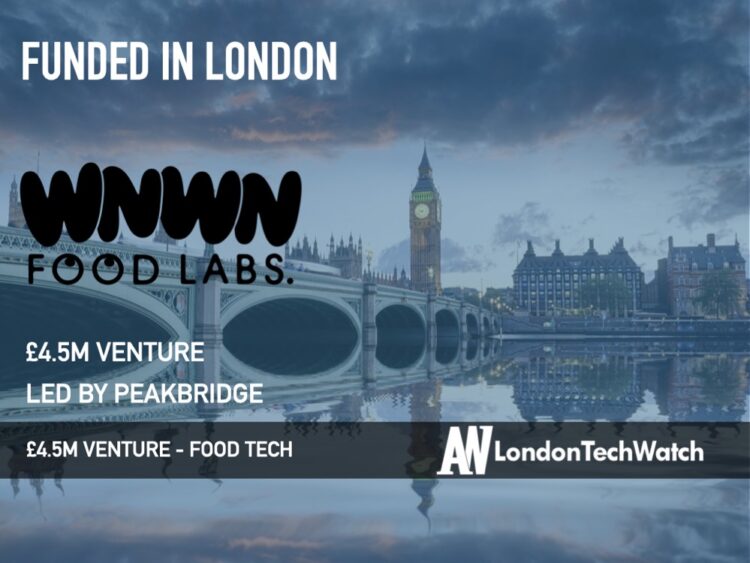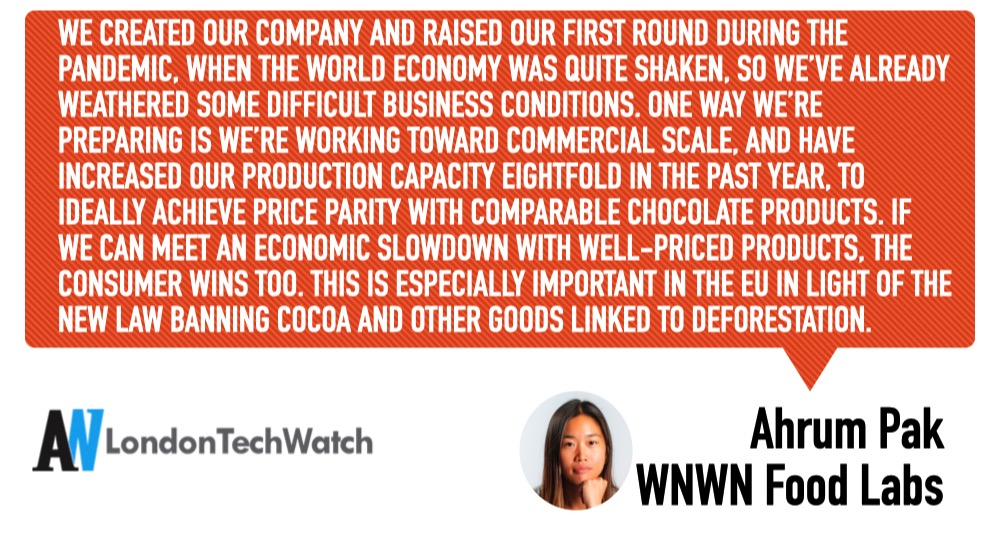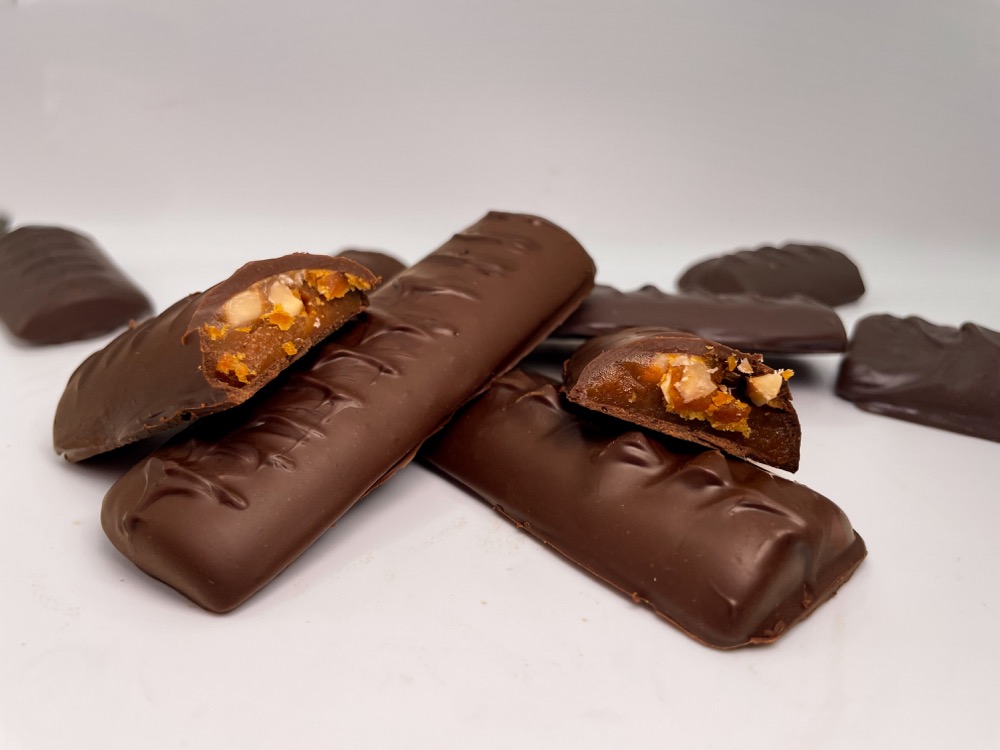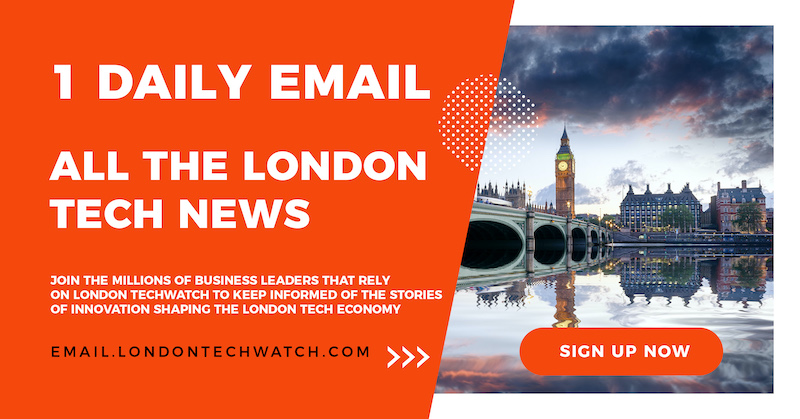The production of chocolate has led to a bittersweet impact as cocoa farmers have turned to deforestation for establishing cocoa plantations. Cocoa farming is also limited to 15 degrees north or south of the Equator, leading to a mass concentration of this biodiversity loss in specific areas of the planet while also being reliant on child labour practices. WNYN Food Labs have developed a fermentation process that allows for the production of chocolate without the use of cocoa which is sustainable and ethical. The plant-based chocolate tastes like chocolate and snaps, melts, and bakes like chocolate, opening up a massive opportunity for the startup founded serendipitously in 2021 (more on that below) to replace the production by traditional chocolate multinationals like Ferrero Group and Mondelez. The company has already released two cocoa-free chocolate products, distributing direct-to-consumer to test the market – a dark chocolate thin and a Waim! Bar. As supply chains are being tested globally and as climate change makes production vulnerable, WNYN is expanding its production and product line to build sustainable ingredients that serve as a win for customers, producers, employers, and brands.
London TechWatch caught up with WNWN Food Labs CEO and Cofounder Ahrum Pak to learn more about the business, the company’s strategic plans recent round of funding, and much, much more…
Who were your investors and how much did you raise?
The round was led by PeakBridge, with participation from FoodLabs (formerly Atlantic Food Labs), Geschwister Oetker Beteiligungen Group via its subsidiary Martin Braun-Gruppe, Mustard Seed Maze, PINC, Investbridge AgriTech, and HackCapital.
We raised £4.5M in our second round.
Tell us about your product or service.
WNWN (pronounced win-win) produces cocoa-free chocolate that is more sustainable and ethical than mass-market industrialised chocolate. We all love chocolate, but most of it comes with an inexcusably high environmental and human rights price: deforestation, habitat destruction, biodiversity loss, and more CO2 emissions per kg than cheese, lamb, or chicken—plus the current cocoa supply chain entrenches cocoa farmers in poverty while exploiting child labour and slave labour. Chocolate is also highly vulnerable to climate change, such as rising temperatures and diminishing rainfall, which means shortages and higher prices are likely in the near future. Our cocoa-free chocolate can challenge Big Chocolate’s monopoly, relieve pressures on the environment and small farmers, and give consumers a choice. Most importantly, it’s delicious! Win-win.
What inspired the start of WNWN Food Labs?
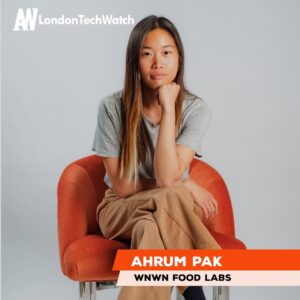 The idea for this particular business came about two years ago. A fortuitous Instagram message led me to my cofounder, Dr. Johnny Drain, a leading expert in flavour and fermentation who had already been thinking about what makes chocolate “chocolate” for a few years. He was a total stranger, but I slid right into his DMs to chit-chat about how fermentation tech is the future, and how we should absolutely start a company together. We discussed how our favourite foods and flavours could be future-proofed and how we could drive change in the production monopolies that perpetuate unfair wages and poor working conditions. We talked about not only chocolate but also coffee, tea and vanilla, all of which have problematic supply chains, but ultimately decided to begin with chocolate, since we both love it.
The idea for this particular business came about two years ago. A fortuitous Instagram message led me to my cofounder, Dr. Johnny Drain, a leading expert in flavour and fermentation who had already been thinking about what makes chocolate “chocolate” for a few years. He was a total stranger, but I slid right into his DMs to chit-chat about how fermentation tech is the future, and how we should absolutely start a company together. We discussed how our favourite foods and flavours could be future-proofed and how we could drive change in the production monopolies that perpetuate unfair wages and poor working conditions. We talked about not only chocolate but also coffee, tea and vanilla, all of which have problematic supply chains, but ultimately decided to begin with chocolate, since we both love it.
How is it different?
The short answer is our chocolate does not come from cacao—the raw beans from which cocoa, and chocolate, is derived. What’s more important is how our choc is the same as what you’re used to eating.
In conventional chocolate, cacao beans are fermented, roasted, and processed. That’s what creates the flavour profiles we know and love as “chocolate.” We do much the same, except we start with different ingredients. We use sustainable, abundant, inexpensive crops that have ethical and transparent supply chains, such as legumes and cereals to do this.
What market you are targeting and how big is it?
Chocolate is one of the most beloved food products on the planet. The overall chocolate market is massive and growing fast. In 2022, consumers globally consumed 180 billion euros of chocolate and the market is expected to increase to 290 billion euros in 2030. However, current cocoa supply chain and production methods cannot meet this growth without continued planetary damage and more terrible ethical practices.
What’s your business model?
B2B and B2C. We supply brands with cocoa-free choc to replace some or all of the mass-market, industrialised cocoa in their products and menu items, and we are working toward having our own branded products in retail later this year.
How are you preparing for a potential economic slowdown?
We created our company and raised our first round during the pandemic, when the world economy was quite shaken, so we’ve already weathered some difficult business conditions. One way we’re preparing is we’re working toward commercial scale, and have increased our production capacity eightfold in the past year, to ideally achieve price parity with comparable chocolate products. If we can meet an economic slowdown with well-priced products, the consumer wins too. This is especially important in the EU in light of the new law banning cocoa and other goods linked to deforestation.
What was the funding process like?
Tough and long! Coming off the back of years of easy money flowing into foodtech, because of various global factors, purse strings were tighter. We had to hustle, to convince even more people of our vision, our product, our readiness. We couldn’t have done that without Food Labs, who led our first round. Big thanks to Christian Guba and Christophe Maire for plugging us into their investor network and advising us on raising in these tricky times. Although it was tougher than if we’d raised in, say, 2020, we learned a lot that will benefit us in the future.
What are the biggest challenges that you faced while raising capital?
We raised our second round in a pretty tricky environment. Geopolitical uncertainty and supply chain issues from both the Ukraine conflict and Covid lent to a rebalancing of valuations and also of investors’ appetite. There’s absolutely more scrutiny on start-ups to prove their product and their potential. We’ve navigated this round to have pulled together an extremely strong consortium of investors that believe in us and in our mission.
What factors about your business led your investors to write the cheque?
I’m a Korean American with an MBA and a background in management consulting and investment banking (triple whammy of ops, strategy and finance). My cofounder is a real-life Willy Wonka with a science PhD from Oxford. Together we bring the right skills to the table to conceive of this vision, and now to build and scale a food tech company.
Investment firms that are focused on creating a more sustainable and equitable food system recognise that the solutions have to be broad and diverse. In the food tech industry there are hundreds of companies in alt-proteins, but very few working on ingredient innovations like ours. Our investors understand that ingredients are fundamental building blocks that can make the entire food system more resilient in the face of climate change and a growing global population.
What are the milestones you plan to achieve in the next six months?
In the next six months, we will be working on developing and premiering our first brand line, and lined up select UK stores and chains for our retail launch. In the interim we’ll continue to supply our cocoa-free choc in a few formats to more CPG companies, restaurants, and other B2B constituents. Plus, we may do a few limited-release product “drops” to keep our hardcore fans and winsiders (WNWN insiders) happy!
What advice can you offer companies in London that do not have a fresh injection of capital in the bank?
Network, build connections, and don’t sleep on marketing and PR. Publicity can give you a lot of bang for the buck. We sold our first products on our own website, only to customers in the UK, but got worldwide press coverage. People might be very interested in what you do, and they might want to support you, but first they have to hear about you.
Where do you see the company going now over the near term?
As above, our priority for the near term is to create the best, and tastiest, products for our retail launch and to create the best relationships with retail and B2B customers.
That effort necessarily involves strengthening our team even more. We will be hiring for various positions at our Hackney Wick HQ, so anyone who believes in what we’re doing and wants to join us should follow us on LinkedIn for job openings.
What’s your favorite coffee shop or location to hold a meeting?
I’d like to give a shout-out to Lyaness, the bar inside the hotel Sea Containers, because it was our first or second real B2B customer. Lyaness has won multiple awards like world’s best bar and world’s best hotel bar, and its creator, Mr Lyan, is considered one of the top bartenders in the world. He is the definition of a tastemaker who is always at the forefront of food and beverage, so we’re thrilled he put us on the menu. If you go, make sure you order the “Comma Chameleon,” a cocktail made with our choc, whisky, and sake liqueur. Oh, and it’s also a fabulous place to hold a meeting over cocktails.


